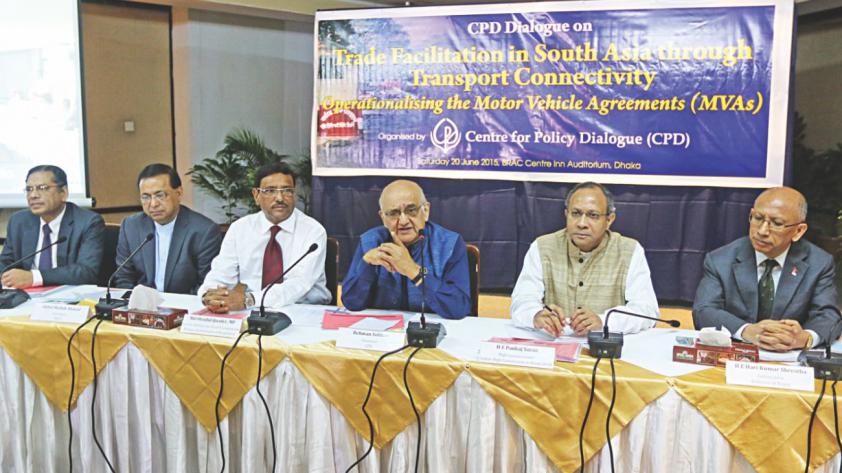Railways should be given the utmost priority when developing multimodal transport connectivity in the Saarc region as it would effectively facilitate cross-border movement of people and goods, speakers at a seminar said.
“Rail connectivity has to get top priority. It will bolster trade and commerce in the region,” Road Transport and Bridges Minister Obaidul Quader said at the seminar organised by the Centre for Policy Dialogue yesterday.
The dialogue was organised to discuss the landmark motor vehicle agreement signed among Bangladesh, Bhutan, India and Nepal in Thimpu on June 15.
The deal will allow seamless movement of passenger and cargo vehicles across their territories.
Many roads will be upgraded to four lanes to support connectivity, Quader said.
ASM Mainuddin Monem, deputy managing director of Abdul Monem Ltd, a leading infrastructure company, said a road network alone will not help to build effective connectivity. Rail and river systems have to be developed as well, he said.
CPD Chairman Rehman Sobhan, who chaired the dialogue, said container, truck and other logistics services providers would be the biggest beneficiaries of connectivity in the region.
The potential benefits from the agreement can be maximised by developing a comprehensive multimodal strategy, Mustafizur Rahman, executive director of CPD, said.
He stressed formulating the strategy as it would encompass four modes of connectivity — trade, transport, investment and people-to-people — all of which are critical to deepening regional integration.
Debapriya Bhattacharya, distinguished fellow of CPD, questioned the preparation, financing, fees and charges for making the agreement operational.
Some $8 billion is needed to develop infrastructure for four-nation road connectivity under the deal. “Where will the financing [for building the infrastructure] come from? Who will pay and how much remain unclear,” Bhattacharya said, adding that many other thorny issues will come to the surface in future.
Apart from the motor vehicle agreement, there are coastal shipping, transhipment, road and railway networks.
“How will all these issues be adopted? Who is coordinating them? What will be the mechanism to deal with this? How will it be translated into reality?” Bhattacharya said.
Ali Ahmed, chief executive of Bangladesh Foreign Trade Institute, said funding all these miles of roads, railways and waterways is of utmost urgency.
Former Tariff Commission Chairman Mojibur Rahman said four countries under the deal can use the Swiss formula to fix the fees and charges. He did not elaborate on the Swiss formula.
“Railway connection is very important for connectivity and mass communication of goods and people,” he said, while asking why Bangladesh would build this infrastructure for others.
Indian High Commissioner to Bangladesh Pankaj Saran said Bangladesh deserves credit for the latest development in the region. But connectivity should not be limited only to land, which is a scarce thing in the region, he said.
“We need to move on in all forms — road, sea, water and railways. Reliance on roads is going to be counterproductive.”
About fees and charges, the diplomat said it is necessary to recognise in agreements that there are specific provisions regarding fees, charges and other service fees.
“It [fee] is absolutely essential. When you talk about transit fee, you have to see the cargo and volume,” he said.
Hari Kumar Shrestha, Nepal’s ambassador to Bangladesh, said allowing his country to use Chittagong and Mongla ports would increase their trade in the region and reduce transportation costs.
Abdul Matlub Ahmad, president of the Federation of Bangladesh Chambers of Commerce and Industry, said China too is coming forward to build connectivity through Myanmar to Kolkata and Bangladesh.
“I see huge business opportunities, especially in logistics.”
Source: The Daily Star










